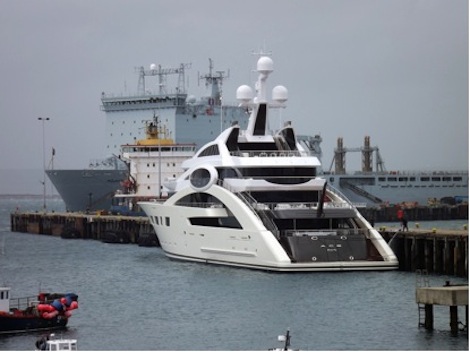Pragmatism required when purchasing superyacht fuel
Following the inspection of several superyachts' fuel documentation in Sanremo, questions have been raised about the legality of purchasing duty-free fuel within the EU. The answer, SuperyachtNews.com has found, requires a proactive dialogue between purchaser and provider.…
According to the note, ‘life for superyachts in the Med these days can seem dicey and fraught, because the simple act of fuelling up can end up as a tax trap.’ Whilst the Sanremo incident is cited, so is the assertion that a number of fuel suppliers are under investigation for selling tax-free fuel in recent years.
Whereas historically, the note continues, commercially registered yachts could purchase tax-free fuel with abandon, customs officers are becoming increasingly stringent in their assessment of who does and does not qualify, and this can extend to previous charter contracts and retrospective documentation inspections.
Although the EU has established minimum excise duties across its member states, it has also allowed these states to additionally apply additional charges or introduce subsidies, leading to a heterogeneous set of rules for the purchase of fuel duty. Of these aforementioned subsidies, the note explains, most are awarded to functional modes of transport, such as agricultural vehicles or commercial ships.
Exceptionally, a few EU countries would permit tax-free fuel to be supplied to foreign-based private pleasure sea craft for outbound voyages. But even that is now dated because it is at odds with EU VAT law, which specifically directs Member States to exclude 'goods transported by the customer himself for the equipping, fuelling and provisioning of pleasure boats and private aircraft or any other means of transport for private use' from the exemption that would otherwise apply when goods are exported from the EU.
Furthermore, for the domestic provision of fuel to private craft, VAT should now be charged at the full rate, with partial refunds only offered to those who can demonstrate visitation to a foreign port.
In summary, the accepted rule should be that fuel purchased within the EU this summer will be the subject of VAT duty. What the Moore Stephens guidance note expresses concern for is the potential for customs officers to pursue revenues retrospectively.
Richard Peacock, a senior trader within Peninsula Petroleum’s yachting division, says that, in purely legal terms, their responsibility for the fuel ends with the completion of the transaction and its loading on board. But, as diligent service providers, “we have to be very much aware of the local terms and conditions”, Peacock said. Furthermore, bunkering providers are increasingly supplying clients with credit for fuel purchases which encourages them to impart their best practices on the loanee. “No bunker provider would want to fly on the edge of the law when they’re supplying these huge amounts of credit to people.”
On the day SuperyachtNews.com spoke to Peacock he had been liaising with a Maldivian-based petroleum company on a request by a visiting yacht for duty-free fuel. The company had recommended that it was ‘not in a position to advise on duty-free fuel. It is the responsibility of the agent or management to get back to you.’ Although this case is not within the boundaries of the EU, it offers an example of the stance providers will take, and the need for managers to remain proactive.
Profile links
NEW: Sign up for SuperyachtNewsweek!
Get the latest weekly news, in-depth reports, intelligence, and strategic insights, delivered directly from The Superyacht Group's editors and market analysts.
Stay at the forefront of the superyacht industry with SuperyachtNewsweek
Click here to become part of The Superyacht Group community, and join us in our mission to make this industry accessible to all, and prosperous for the long-term. We are offering access to the superyacht industry’s most comprehensive and longstanding archive of business-critical information, as well as a comprehensive, real-time superyacht fleet database, for just £10 per month, because we are One Industry with One Mission. Sign up here.
NEW: Sign up for
SuperyachtNewsweek!
Get the latest weekly news, in-depth reports, intelligence, and strategic insights, delivered directly from The Superyacht Group's editors and market analysts.
Stay at the forefront of the superyacht industry with SuperyachtNewsweek




